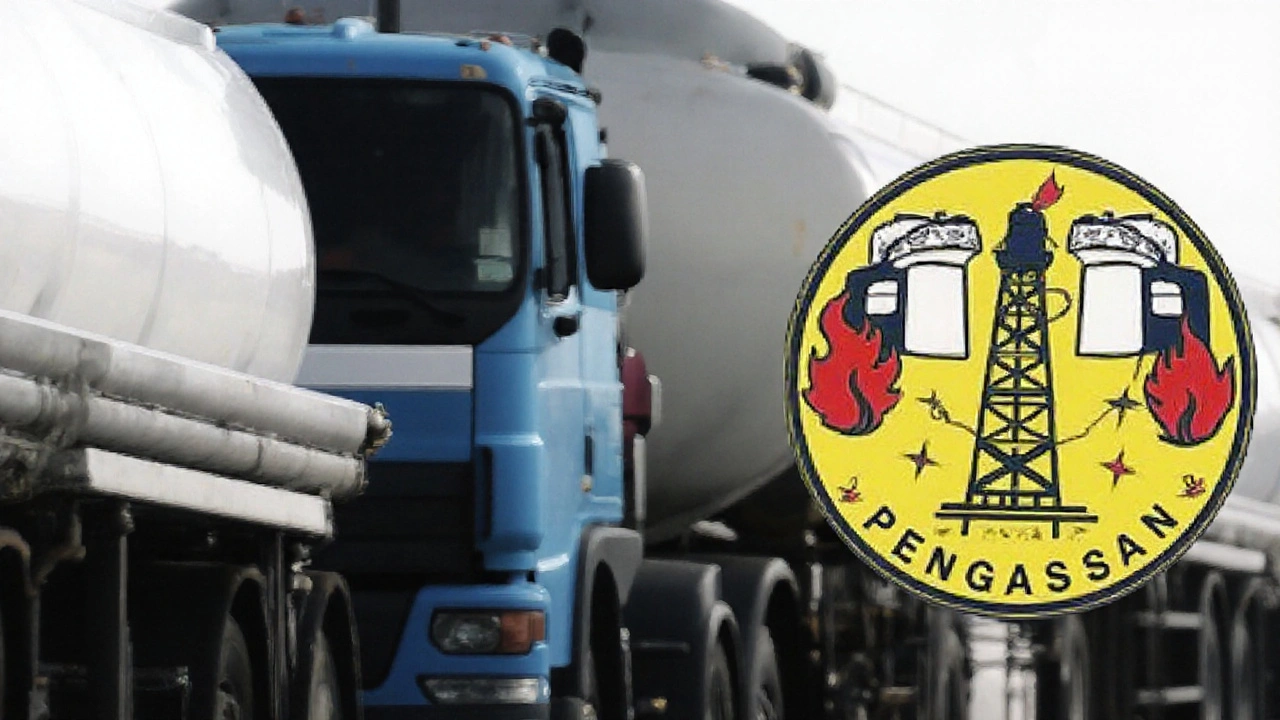What sparked the controversy?
Late Wednesday night, workers at the newly built Dangote Petroleum Refinery received termination letters that would soon dominate headlines across Nigeria. According to the Petroleum and Natural Gas Senior Staff Association of Nigeria (PENGASSAN), more than 800 Nigerian employees were abruptly let go. The union says the cuts came just hours after 90% of those workers signed up for PENGASSAN membership, a timing it finds “suspicious at best and retaliatory at worst.”
General Secretary Lumumba Okugbawa described the dismissals as "unjust" and urged the refinery to recall the staff. President Festus Osifo confirmed that the letters arrived late on Wednesday and added that the union is already mobilising a response to protect the affected workers.
Beyond the terminations, PENGASSAN claims the refinery replaced the Nigerian staff with a large contingent of Indian nationals. The union also alleges that management pulled staff buses in the evening, forcing workers to cover their own transport costs—an act it says was meant to add pressure on the shaken workforce.

Company’s version and the sabotage narrative
A senior official from the refinery disputed the notion of a “mass sack.” While acknowledging that a letter about workforce changes had been issued, he insisted the document was misinterpreted. According to Dangote, the personnel reshuffle is part of a broader re‑organisation aimed at curbing sabotage that has been detected inside the plant.
Dangote Industries, the conglomerate behind the refinery, argues that the adjustments are necessary to secure the facility’s operational integrity. The company’s spokesperson said the move has nothing to do with workers’ right to unionise and emphasized that any allegations linking the changes to union activity are unfounded.
In recent months, the refinery has already been under pressure from the Depot and Petroleum Products Marketers Association of Nigeria (DPPMAN) over product pricing and distribution. This latest spat adds a new layer to the ongoing friction between labour groups and the refinery’s management.
Both sides are now at a crossroads. PENGASSAN has issued a formal ultimatum demanding the immediate reinstatement of the dismissed workers. If the refinery does not comply, the union warned it will organise picket lines and other forms of industrial action. The threat of a picket at one of Africa’s most high‑profile oil projects could have ripple effects on fuel supply and pricing across the region.
Industry experts point out that the situation also raises broader questions about labour rights in Nigeria’s oil sector. The country’s labour law mandates that any mass termination must be preceded by proper consultation and notice. If the union’s claims are verified, the refinery could face legal challenges or sanctions from the Ministry of Labour.
Meanwhile, workers on the ground are coping with uncertainty. Many report that without the company‑provided transport, they have had to arrange costly private rides, further straining already tight household budgets. Families of the dismissed staff are pressing local representatives for assistance, hoping political pressure might sway the refinery’s stance.
On the other side of the debate, the refinery’s management insists that sabotage poses a real threat to the plant’s safety and profitability. They cite internal investigations that allegedly uncovered tampering with critical equipment—a claim that, if true, could justify swift and decisive staffing changes.
As the standoff unfolds, observers are watching to see whether the dispute will stay confined to the refinery’s gates or spill over into Nigeria’s broader energy policy discussion. The outcome could set a precedent for how foreign‑owned or –operated facilities handle labour relations, especially when national workforce development and unionisation are at play.
For now, PENGASSAN is preparing its members for possible action, while Dangote Refinery continues to maintain that its restructuring is solely a security measure. The next few weeks will likely determine whether negotiations can bridge the gap or whether the conflict escalates into a full‑blown industrial showdown.

Gauri Sheth
September 27, 2025 AT 02:15It feels like another chapter in the saga of corporate greed where the lives of ordinary folks are tossed aside like scraps. The way these 800 workers were axed overnight, right after they barely had the chance to join a union, reeks of retaliation. I can hear the cries of those families, the sleepless nights, the unanswered questions. This isn’t just a business decision; it’s a human tragedy masked as efficiency. If anything, this should ignite a firestorm of solidarity across the continent, not be brushed under the rug.
om biswas
September 29, 2025 AT 09:49Stop painting the Indians as the villain here. The refinery needs skilled hands, and we have a wealth of talent ready to step in. It’s absurd to claim this is a plot against Nigerian workers when the reality is that sabotage demands a swift, decisive response. If the plant is being tampered with, any competent workforce will do, regardless of nationality. Let the union drama fade; focus on keeping the lights on.
sumi vinay
October 1, 2025 AT 17:22Hey everyone, I know the news looks bleak, but there’s always a silver lining. This could be a catalyst for stronger worker protections and maybe even better training programs for locals. If the refinery truly values security, they’ll invest in up‑skilling rather than just replacing staff. Let’s keep hope that this pressure leads to positive change for all sides involved.
Anjali Das
October 4, 2025 AT 00:55Replacing locals with foreigners just shows the management’s disregard for national talent. They think money can buy loyalty, but they forget the heart of a nation beats in its people.
Dipti Namjoshi
October 6, 2025 AT 08:29The plight of the dismissed workers at the Dangote Refinery is more than a headline; it is a stark reminder of the delicate balance between industrial progress and human dignity. When a corporation of such magnitude chooses to uproot hundreds of families, it sends ripples that extend far beyond the factory gates, reverberating through communities, local economies, and the collective psyche of a nation. One must consider the socioeconomic fabric that these workers weave daily: the school fees paid, the medical expenses covered, the modest savings that ensure a buffer against unforeseen hardships. To sever those ties abruptly, without transparent justification, strains not only the immediate households but also erodes trust in the institutions that are supposed to safeguard workers’ rights. Moreover, the alleged substitution with foreign nationals raises questions about the long‑term vision for capacity building within the country. Are we fostering a reliance on external expertise at the expense of nurturing indigenous talent? The answer to that will shape future policy discussions on labor autonomy. It is also essential to reflect on the claimed motive of sabotage mitigation. While operational security is paramount, any genuine threat should be addressed through rigorous investigations, not through blanket dismissals that punish the many for the alleged sins of a few. The union’s mobilization underscores a broader concern: when workers feel unheard, they must find collective avenues to voice their grievances, lest the silence breed dissent. The potential industrial action, while disruptive, may serve as a catalyst for dialogue, highlighting the need for balanced solutions that protect both the refinery’s assets and the livelihood of its staff. In the meantime, the affected families now grapple with immediate challenges-transport costs, loss of income, and uncertainty about the future. Community solidarity, governmental intervention, and perhaps legal recourse could alleviate some of this burden. Finally, this episode invites a critical examination of labor legislation enforcement in Nigeria’s oil sector. Robust compliance mechanisms are essential to ensure that economic development does not trample on fundamental human rights. As observers, we must watch closely how this standoff resolves, hoping for a outcome that upholds justice, fairness, and sustainable growth for all stakeholders.
Prince Raj
October 8, 2025 AT 16:02From a strategic standpoint, the restructuring aligns with risk mitigation protocols. Integrating specialists with proven anti‑sabotage track records can reduce operational downtime. However, the transition must be managed with clear communication to avoid labor unrest and preserve brand reputation.
Gopal Jaat
October 10, 2025 AT 23:35This drama feels like a tragic play where the workers are the unsuspecting victims and the management the cold, calculating director. The stage is set, the lights are dim, and the audience can only watch as lives are tossed aside.
UJJAl GORAI
October 13, 2025 AT 07:09Ah, the classic tale of “security” versus “rights”. One might wonder if the real sabotage is the erosion of trust between employer and employee. It’s almost poetic, isn’t it? How the very measures meant to protect become the instruments of alienation.
Satpal Singh
October 15, 2025 AT 14:42While it’s understandable to prioritize safety, the abrupt nature of these dismissals raises legitimate concerns about due process. A transparent dialogue with the union could pave the way for solutions that address both security and employment stability.
Devendra Pandey
October 17, 2025 AT 22:15The philosophical underpinnings of this conflict reveal a deeper paradox: a system designed to harness collective effort now undermines that very collectivity. It is not merely a managerial decision but a reflection of systemic hierarchies that prioritize capital over community.
manoj jadhav
October 20, 2025 AT 05:49Indeed, finding a middle ground is essential; we must strive for solutions that respect security imperatives while safeguarding the dignity and livelihoods of workers.
saurav kumar
October 22, 2025 AT 13:22Progress demands empathy.
Ashish Kumar
October 24, 2025 AT 20:55It is disheartening to witness such heavy‑handed tactics; the moral compass of any corporation should point towards fairness, not opportunistic cuts.
Pinki Bhatia
October 27, 2025 AT 03:29While we can critique the approach, it is also vital to acknowledge the human impact on families who now face uncertainty and hardship.
NARESH KUMAR
October 29, 2025 AT 11:02Great point! 🌟 Let’s keep the conversation constructive and supportive for all those affected. 🙌
Purna Chandra
October 31, 2025 AT 18:35It’s suspicious how quickly foreign workers are parachuted in after the locals are dismissed; perhaps there’s an undisclosed agenda to shift control. I’d wager this isn’t merely about sabotage but about consolidating influence.
Mohamed Rafi Mohamed Ansari
November 3, 2025 AT 02:09From a technical perspective, the integration of new personnel should be accompanied by rigorous training modules to ensure operational continuity and safety standards are upheld.
अभिषेख भदौरिया
November 5, 2025 AT 09:42Indeed, the emphasis on proper onboarding cannot be overstated; it serves both the refinery’s interests and those of the displaced workers who deserve a clear path forward.
Nathan Ryu
November 7, 2025 AT 17:15The narrative that paints this as merely a security measure neglects the profound ethical implications of mass layoffs without consultation.